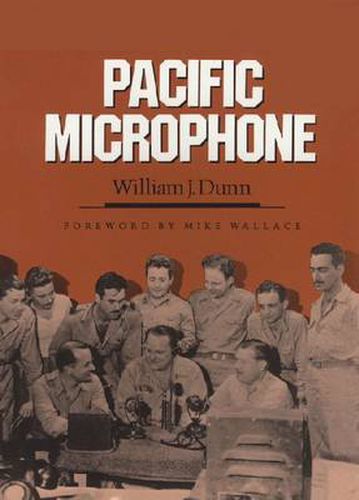Readings Newsletter
Become a Readings Member to make your shopping experience even easier.
Sign in or sign up for free!
You’re not far away from qualifying for FREE standard shipping within Australia
You’ve qualified for FREE standard shipping within Australia
The cart is loading…






This title is printed to order. This book may have been self-published. If so, we cannot guarantee the quality of the content. In the main most books will have gone through the editing process however some may not. We therefore suggest that you be aware of this before ordering this book. If in doubt check either the author or publisher’s details as we are unable to accept any returns unless they are faulty. Please contact us if you have any questions.
In the famous sculpture of Gen. Douglas MacArthur’s triumphant return to the Philippines in 1944, one man follows the general onto the beach wearing neither helmet nor hat. That man is a radio reporter, one of only a handful who covered the war in the Pacific for the Americans back home. That man is Bill Dunn. This is his story of that war.
CBS sent reporter Dunn to the Orient nearly a year before the attack on Pearl Harbor to survey broadcast facilities for the coverage of the anticipated hostilities. In Rangoon he learned that his nation was at war. After moving to Batavia to cover the fall of the Netherlands East Indies, he escaped to Australia, where he joined MacArthur’s staff for the duration. From that vantage point he covered air, land, and sea battles, campaign planning, ground combat, and the liberation of internment and POW camps. At Japan’s surrender, he was dean of correspondents in the Southwest Pacific, a distinction that earned him an early entry into defeated Tokyo and a bird’s-eye view of the signing of the surrender document.
Based on Dunn’s memories and the transcripts of his broadcasts from the field, Pacific Microphone presents the first written account of the vagaries and headaches of providing radio coverage of a war that encompassed half the globe, including vast areas where modern electronics were limited. It also offers some unique viewpoints of certain aspects of the Pacific war, the insights of a professional observer who came to know the men and women who fought that war on land, air, and sea, and, certainly, the commanding minds that provided the direction and leadership that resulted in ultimate victory.
Bill Dunn has some unexpected and fascinating memories of MacArthur that add to our collective historical knowledge. This is … a first-rate description of how the news was carried from the warfront to the civilian rear, and an altogether inspiring memoir of what it was like out there in the bloody, traumatic Pacific war. –from the foreword by Mike Wallace, CBS News/60 Minutes
So far as I know there has never been such a chronicling by a newsman of equal qualifications.. –Douglas Edwards, CBS News
An engagingly anecdotal war memoir … that affords insights as well as intelligence. –Kirkus Reviews
$9.00 standard shipping within Australia
FREE standard shipping within Australia for orders over $100.00
Express & International shipping calculated at checkout
This title is printed to order. This book may have been self-published. If so, we cannot guarantee the quality of the content. In the main most books will have gone through the editing process however some may not. We therefore suggest that you be aware of this before ordering this book. If in doubt check either the author or publisher’s details as we are unable to accept any returns unless they are faulty. Please contact us if you have any questions.
In the famous sculpture of Gen. Douglas MacArthur’s triumphant return to the Philippines in 1944, one man follows the general onto the beach wearing neither helmet nor hat. That man is a radio reporter, one of only a handful who covered the war in the Pacific for the Americans back home. That man is Bill Dunn. This is his story of that war.
CBS sent reporter Dunn to the Orient nearly a year before the attack on Pearl Harbor to survey broadcast facilities for the coverage of the anticipated hostilities. In Rangoon he learned that his nation was at war. After moving to Batavia to cover the fall of the Netherlands East Indies, he escaped to Australia, where he joined MacArthur’s staff for the duration. From that vantage point he covered air, land, and sea battles, campaign planning, ground combat, and the liberation of internment and POW camps. At Japan’s surrender, he was dean of correspondents in the Southwest Pacific, a distinction that earned him an early entry into defeated Tokyo and a bird’s-eye view of the signing of the surrender document.
Based on Dunn’s memories and the transcripts of his broadcasts from the field, Pacific Microphone presents the first written account of the vagaries and headaches of providing radio coverage of a war that encompassed half the globe, including vast areas where modern electronics were limited. It also offers some unique viewpoints of certain aspects of the Pacific war, the insights of a professional observer who came to know the men and women who fought that war on land, air, and sea, and, certainly, the commanding minds that provided the direction and leadership that resulted in ultimate victory.
Bill Dunn has some unexpected and fascinating memories of MacArthur that add to our collective historical knowledge. This is … a first-rate description of how the news was carried from the warfront to the civilian rear, and an altogether inspiring memoir of what it was like out there in the bloody, traumatic Pacific war. –from the foreword by Mike Wallace, CBS News/60 Minutes
So far as I know there has never been such a chronicling by a newsman of equal qualifications.. –Douglas Edwards, CBS News
An engagingly anecdotal war memoir … that affords insights as well as intelligence. –Kirkus Reviews